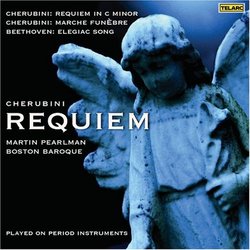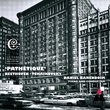| All Artists: Ludwig van Beethoven, Luigi Cherubini, Martin Pearlman, Boston Baroque Title: Cherubini - Requiem Members Wishing: 0 Total Copies: 0 Label: Telarc Original Release Date: 1/1/2007 Re-Release Date: 1/23/2007 Genre: Classical Styles: Opera & Classical Vocal, Chamber Music, Historical Periods, Classical (c.1770-1830), Early Music Number of Discs: 1 SwapaCD Credits: 1 UPC: 089408065828 |
Search - Ludwig van Beethoven, Luigi Cherubini, Martin Pearlman :: Cherubini - Requiem
 | Ludwig van Beethoven, Luigi Cherubini, Martin Pearlman Cherubini - Requiem Genre: Classical
Cherubini's Requiem in C minor, by turns ethereal, highly dramatic and ultimately transcendent, was triumphantly premiered on January 21, 1817 in a memorial concert below the abbey church of St. Denis to commemorate the... more » |
Larger Image |
CD DetailsSynopsis
Album Description Cherubini's Requiem in C minor, by turns ethereal, highly dramatic and ultimately transcendent, was triumphantly premiered on January 21, 1817 in a memorial concert below the abbey church of St. Denis to commemorate the anniversary of the executions of Louis XVI and Marie Antoinette. The bodies of the long deposed monarchs had been searched for and found a few years earlier and were finally being laid to rest in the crypt of St. Denis. Though held in the highest esteem by many of the greatest composers of his time, this first of Cherubini's two Requiems fell into obscurity by the end of the 19th century. The new recording gives the work a new lease on life and invites listeners who have long treasured - and even helped popularize - the great and varied Requiems by composers such as Mozart, Brahms, Fauré, Verdi and even Britten to discover a deeply satisfying and unjustly neglected masterpiece. Cherubini's Requiem is scored for chorus and orchestra, but, surprisingly, does not feature vocal soloists. As Martin Pearlman observes, "It is as if the composer has distanced himself as far as possible from his other life in opera." Violins are omitted in the opening two movements, creating an especially somber orchestral color. A single dramatic stroke of the tam-tam (gong) at the opening of the Dies irae (Day of wrath) is no doubt the work's most famous moment (or perhaps infamous, as some early listeners found it ill-suited for a religious work)-- and must have terrified listeners at the work's premiere. Also notable is the work's unusual ending, where the music fades away in a long, haunting diminuendo that Berlioz said, "surpasses anything of the kind that has been written." The new album opens, appropriately, with another rarely heard work of transcendent cast, Beethoven's sublime Elegiac Song, Op. 118. Written in the summer of 1814 for a friend whose wife had died in childbirth, the simple anonymous text, sung in German, is tenderly set by the composer: Gently, as you lived, thus have you died, too holy for sorrow! Let no eye shed tears for the heavenly spirit's return home. As Martin Pearlman explains in the liner notes, "Beethoven composed this small gem at the beginning of a difficult time in his life, a period in which he produced a few major works but appeared to be rethinking his musical vocabulary...While the Elegiac Song can hardly be said to anticipate the style of the late quartets, it does reflect a sense of searching, a sense that nothing is conventional, even in a small pièce d'occasion." An additional Cherubini work, the March funèbre (1820), closes the album in dramatic fashion. Referring to its repeated gong strokes and "passionate dissonances," Martin Pearlman observes, "As we might expect from a march, this is ceremonial music, very different in spirit from the profoundly emotional Requiem, and it indulges much more freely in theatrical effects." Similarly Requested CDs
|
CD ReviewsThey All Agreed...Cherubini was great. Samuel Stephens | TN, USA | 12/23/2007 (5 out of 5 stars) "Ok, so if you aare new to choral music, this may not be the best way into it...as the two reviewers above can testify. But let there be no doubts about it, this IS great music. If Beethoven, Berlioz, Brahms and Wagner can all agree on something (as the CD blurb tells us), you know it has to be good. Well, they all admired this composer (Cherubini), and this work in particular. If you think this work occasionaly sounds like another composer, then you have it backwards. Other composers sound like Cherubini. Even Beethoven looked up to him. This reading by the Boston Baroque is superb: as far as mainstream performances go, there are few better than this. I'm still a little confused by the lukewarm reaction by the two above reviewers; perhaps Cherubini is more of a composer's composer, rather than a people's composer? I personally think he is accessible. Enjoy this music." Pleasant enough, but not great music Teemacs | Switzerland | 02/14/2007 (4 out of 5 stars) "Having enjoyed Martin Pearlman's excellent account of the Monteverdi Vespers and seeing this recommended to me by amazon.com as a result, I thought I'd try it, never having heard it (or, for that matter, heard of it). The Requiem is unusual in that it uses no soloists, purely orchestral and choral forces. Pearlman and the Boston Baroque do an excellent job, as one would expect, but the music is, to my ears, good, but not great. It is pleasantly listenable, but it is simply not the thing you (well, OK, I) would drag out for repeated listenings. It lacks that certain stamp of greatness that characterises the great religious masterpieces (Monteverdi's 1610 Vespers, the B Minor Mass, the Bach Passions, the Haydn and Mozart masses, the Missa Solemnis). "Music," said Beethoven, "should strike fire from a man's soul." My soul remained unstruck, never mind unfired."
|

 Track Listings (10) - Disc #1
Track Listings (10) - Disc #1






